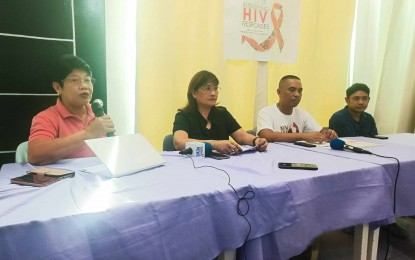
INTERVENTIONS. Nenita Laude-Ortega, AHF Philippines country manager (left) answers media questions during a press conference about human immunodeficiency virus (HIV) response in Legazpi City on Wednesday (May 29, 2024). Bicol Region has recorded 2,553 cases since 1984, with a significant rise observed over the past three years. (Photo courtesy of Reynard Sevillano)
LEGAZPI CITY – Two non-profit organizations are strengthening their efforts to provide correct, timely, and accurate information about the human immunodeficiency virus (HIV) and how to prevent the spread of infections in the Bicol Region.
In a press conference here on Wednesday, Nenita Laude-Ortega, AIDS Healthcare Foundation (AHF) Philippines country manager, said they are conducting various forums and educational campaigns in schools and workplaces to break down the stigma surrounding HIV and AIDS and to avoid complications.
The Los Angeles-based group is currently the largest provider of HIV/AIDS medical care in the world, providing cutting-edge medicine to over 1,900,000 people in 45 countries.
Ortega said for prevention, they combine counseling with testing, distribute condoms and lubricants, and provide pre-exposure prophylaxis (PrEP).
"Let's help each other because you'll never know if you have a relative who is affected already. We need to go to the community down to the barangay level to reach and disseminate information about HIV and its effects. The direction of the Department of Health (DOH) is to deal with the prevention intervention not only for HIV but also for overall reproductive health and sexuality education," she said.
She noted the importance of community involvement, especially at the barangay level, and highlighted the role of barangay health workers (BHW) in identifying at-risk individuals.
"They know in their community who is potentially risky, who is pregnant, and who has an LGBT (lesbian, gay, bisexual and transgender) member at home. We must provide our BHW with technical assistance from nurses, medical technologists, and midwives. They are the available human resources from the ground that can support the program," she said.
AHF, along with Gentlemen Bicol, a non-profit organization based in Daraga town, is willing to conduct lectures and free testing in schools and workplaces.
"There is no cure but the treatments will help individuals living with HIV to have a longer life. The anti-retroviral treatment is free of charge and given to different government facilities," Ortega said.
DOH has reported an increase in HIV cases in the region, with Camarines Sur, Albay, and Sorsogon being the most affected provinces.
The region has recorded 2,553 cases since 1984, with a significant rise observed over the past three years: 2021 -- 264; 2022 -- 361; and 2023 --- 397.
The two groups said the most affected demographic is young adults aged 25–34. (PNA)
